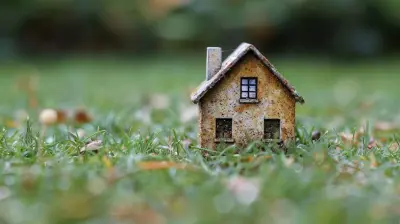Should You Sell Your Home or Rent It Out? Pros and Cons
16 August 2025
Deciding what to do with your home—sell it or rent it out—can be one of the biggest financial decisions you’ll make. Maybe you're moving for a job, upgrading to a bigger place, or simply looking for a change. Either way, the choice isn’t always easy.
Selling means cashing out and moving on, while renting could mean a steady stream of passive income. But which option is best for you? Let’s dive into the pros and cons of both, so you can confidently make the right decision.
Selling Your Home
Selling your house might seem like the simplest solution. You get your equity back, say goodbye to maintenance responsibilities, and move forward. But is it always the best decision? Let’s break it down.Pros of Selling Your Home
1. Immediate Lump Sum Cash
When you sell, you receive a large amount of money upfront. This can be used for a down payment on your next home, paying off debts, or investing elsewhere.2. No Ongoing Responsibilities
Owning a rental means dealing with maintenance requests, tenant issues, and property management. Selling eliminates these headaches.3. If the Market is Hot, You Can Maximize Profit
If home prices are at an all-time high, selling could mean a hefty return on your investment. Timing the market right could help you walk away with a profit.4. Reduced Financial Risk
The housing market fluctuates. By selling, you’re cashing in now instead of gambling on future market conditions.Cons of Selling Your Home
1. Losing a Potential Long-Term Investment
Real estate usually appreciates over time. By selling, you may miss out on future value growth.2. Selling Costs Can Eat Into Profits
Commissions, closing costs, and potential repairs can take a chunk out of your proceeds.3. Taxes on Capital Gains
Depending on how long you’ve lived in your home and local tax laws, you might have to pay capital gains taxes on your profits.4. Limited Flexibility
If you ever want to move back, you’d have to buy again—possibly at a much higher price.
Renting Out Your Home
Renting your home can turn it into an income-generating asset. But is being a landlord right for you? Let’s look at both sides.Pros of Renting Your Home
1. Passive Income Stream
A well-placed rental property can generate steady rental income every month, potentially covering your mortgage and even making you a profit.2. Property Value May Appreciate
If the market continues to grow, your home’s value may increase over the years, leading to greater long-term wealth.3. Flexibility to Return
If you’re moving temporarily or want to keep your options open, renting allows you to return to your home in the future.4. Tax Benefits
Landlords can deduct mortgage interest, property taxes, repairs, insurance, and even depreciation to reduce taxable income.Cons of Renting Your Home
1. Being a Landlord is Work
Renting isn’t completely passive. You’ll need to manage tenants, handle repairs, and deal with potential vacancies.2. Bad Tenants Can Be a Nightmare
Not all tenants pay on time or take care of your property. Evictions, legal disputes, and property damage are risks.3. Market Fluctuations Could Hurt Rental Income
If the local rental market declines, you might struggle to find tenants or be forced to lower rent.4. Ongoing Maintenance Costs
As a landlord, you’re responsible for repairs and upkeep, which can eat into your profits.
Key Factors to Consider Before Making Your Decision
Deciding whether to sell or rent isn't one-size-fits-all. Here are key factors to evaluate:1. Your Financial Situation
- Do you need the lump sum from selling, or can you afford to hold onto the home?- Can you cover mortgage, taxes, and maintenance if the home sits vacant for a few months?
2. Your Local Real Estate Market
- Is it a seller’s market where homes are selling quickly and at high prices?- Or is rental demand strong, with high rents and low vacancy rates?
3. Your Long-Term Plans
- Are you planning to return to the area?- Do you want to build long-term wealth through real estate?
4. Your Risk Tolerance
- Can you handle the unpredictability of being a landlord?- Are you comfortable with fluctuations in the real estate market?

When Selling Makes More Sense
- You need cash now for a new home, investment, or financial goal.- The market is at its peak, and you can sell for a great profit.
- You don’t want to deal with the responsibilities of being a landlord.
- You’re moving permanently and won’t need to return.
When Renting is the Better Option
- You want long-term passive income and property appreciation.- You can afford to manage potential vacancies or maintenance costs.
- You’re moving temporarily and might return in the future.
- You’re in a strong rental market where demand is high.
The Bottom Line
At the end of the day, the right decision depends on your financial goals, lifestyle, and the strength of the local market. If you need immediate cash and want a clean break, selling might be your best bet. However, if you’re looking for long-term financial growth and passive income, renting is worth considering.Whatever you choose, just make sure you're making the decision based on logic, not just emotion. Weigh the pros and cons carefully, and if needed, seek advice from a real estate professional. After all, your home is one of your biggest assets—it’s worth taking the time to make the best choice for your future.
all images in this post were generated using AI tools
Category:
Sellers GuideAuthor:

Vincent Clayton
Discussion
rate this article
1 comments
Yolanda McDougal
Deciding whether to sell or rent your home involves weighing financial stability against long-term investment potential. Selling provides immediate capital, while renting may generate ongoing income and property appreciation. Assess your financial goals and market conditions before making a decision.
August 30, 2025 at 4:15 AM

Vincent Clayton
Thank you for your insightful comment! You’ve captured the key considerations perfectly. Balancing immediate financial needs with long-term investment potential is crucial in making this decision.


